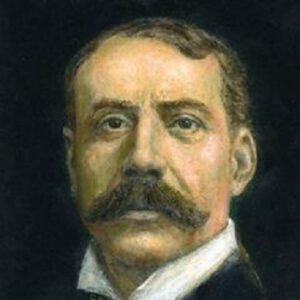De Engelse dichter en herpetoloog Arthur William Edgar O’Shaughnessy werd geboren op 14 maart 1844 in Londen. Op 17-jarige leeftijd werd hij klerk in de bibliotheek van het British Museum en op 19-jarige leeftijd werd hij herpetoloog op de zoölogische afdeling van het museum. Tussen 1874 en 1881 beschreef hij zes nieuwe soorten reptielen. Albert Günther noemde een kameleon naar hem (Calumma oshaughnessyi) en in totaal werden vier reptielsoorten naar hem vernoemd (door Günther en George Albert Boulenger). O’Shaughnessy publiceerde zijn gedichten voor het eerst in 1870 in zijn bundel “Epic of Women”. Het volgende deel “Lays of France” volgde in 1872, eveneens met matig succes. Een jaar later trouwde hij met Eleanor Marston, de dochter van de auteur John Westland Marston en zus van de dichter Philip Bourke Marston. Ze kregen twee kinderen, die beiden op jonge leeftijd overleden. Zijn laatste gedichten verschenen in 1874: “Music and Moonlight”. Vanwege het gebrek aan succes van zijn werken besluit hij om geen gedichten meer te publiceren. Een jaar later verscheen het boek “Toy-land”, een kinderboek dat hij samen met zijn vrouw schreef. In 1879, twee jaar voor zijn dood, stierf zijn vrouw. Zijn laatste dichtbundel, “Song of a Worker”, verscheen in 1881, kort na zijn dood. O’Shaughnessy werd tijdens zijn leven niet erkend en zou pas aan het begin van de 21e eeuw populair worden. Een van zijn bekendste en meest geciteerde gedichten is de ode uit zijn boek Music and Moonlight: “We are the music-makers”.
We are the music-makers
We are the music-makers,
And we are the dreamers of dreams,
Wandering by lone sea-breakers,
And sitting by desolate streams.
World-losers and world-forsakers,
Upon whom the pale moon gleams;
Yet we are the movers and shakers,
Of the world forever, it seems.
With wonderful deathless ditties
We build up the world’s great cities,
And out of a fabulous story
We fashion an empire’s glory:
One man with a dream, at pleasure,
Shall go forth and conquer a crown;
And three with a new song’s measure
Can trample an empire down.
We, in the ages lying
In the buried past of the earth,
Built Nineveh with our sighing,
And Babel itself with our mirth;
And o’erthrew them with prophesying
To the old of the new world’s worth;
For each age is a dream that is dying,
Or one that is coming to birth.
Summer Has Come Without The Rose
Has summer come without the rose,
Or left the bird behind?
Is the blue changed above thee,
O world! or am I blind?
Will you change every flower that grows,
Or only change this spot,
Where she who said, I love thee,
Now says, I love thee not?
The skies seemed true above thee,
The rose true on the tree;
The bird seemed true the summer through,
But all proved false to me.

Arthur O’Shaughnessy (14 maart 1844 – 30 januari 1881)
